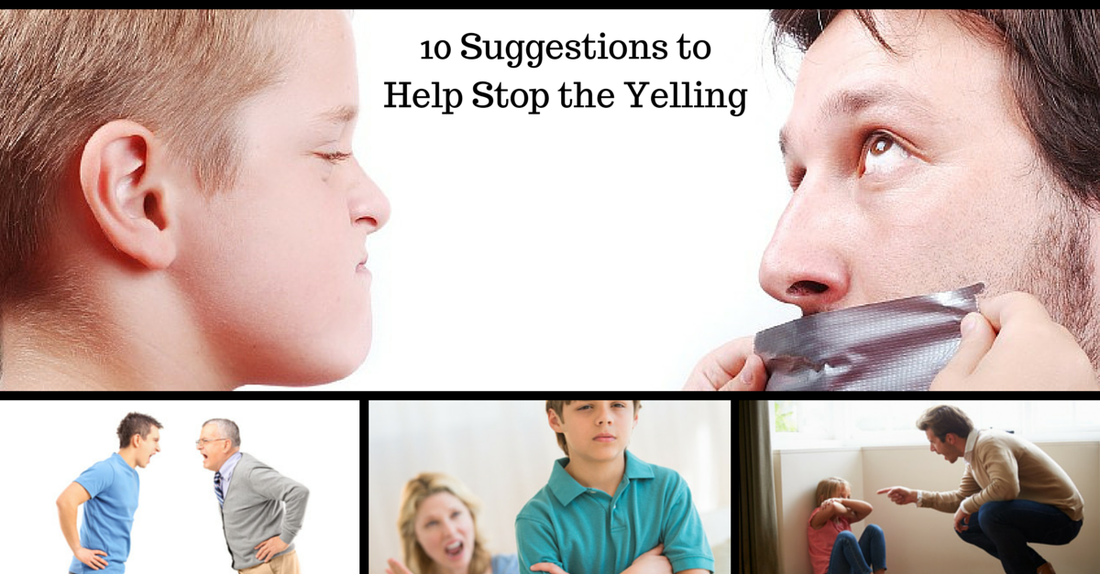|
Have you ever been yelled at as an adult? Maybe it was in traffic or when you accidentally spilled something on a brute at a ball game. Whatever the situation, how did it make you feel? Did you feel your face get red? Were you embarrassed or angry? After the fact, even hours later, did you feelvengeful or keep thinking of things you could have or should have yelled back at the person? Now, rewind to the last time you yelled at your child. Do you think they feel much differently? Do you think raising your voice or using harsh words helps or hurts the relationship with young people?
The Bible says in Ephesians 4:29-32, "Let no corrupt communication proceed out of your mouth, but that which is good to the use of edifying, that it may minister grace unto the hearers. (30) And grieve not the Holy Spirit of God, whereby ye are sealed unto the day of redemption. (31) Let all bitterness, and wrath, and anger, and clamor, and evil speaking, be put away from you, with all malice: (32) And be ye kind one to another, tenderhearted, forgiving one another, even as God for Christ's sake hath forgiven you." There is powerful truth in this passage regarding communication in general especially at home, but let’s focus for now on the word “clamor” in verse 21. The word comes from a word that means to croak (as a raven) or scream that is, shriek, cry (out). This unfortunately describes most every one of us as parents at one time or another in the way we speak to our kids. We lose control because we had a long day, our kids get under our skin, they disobey or disrespect one too many times and instead of responding firmly in love, we respond firmly in anger, clamor and evil speaking. Instead of solving the problem, we makes it worse. Here are 10 suggestions for dealing with yelling and/or its aftermath. 1. If you’re guilty, make it right. If you know you’ve been wrong in this area, let your child know you were wrong, you feel badly about it and you are going to take steps to correct this issue. This may be difficult, but it will help you and your child. Make sure you also go to the Lord and ask for forgiveness and help as well. He will not only forgive us but strengthen us to overcome our sin. (I John 1:9) 2. Communicate with your child in age appropriate ways that you struggle with anger and yelling at times. Let them know you are praying for victory and ask for their help. Let them know what actions cause you to struggle more. Don’t blame them or make them feel your sin is their fault (it’s not) but communicate that their actions do make a difference. 3. Give advance warning when possible to avoid the yelling. Let your child know that their actions are elevating your emotions in a negative way and that you feel like you’re going to explode. Let them know when possible that you both need to work to defuse the situation immediately. 4. Pray. Ask God right there in the heat of the moment to give you strength to control your words and voice. Step away and cool down if possible. 5. Envision a stage. God sees your actions, but imagine that a group of your peers or co-workers are watching you and your child on a stage. Would your yelling embarrass you in front of them? Perhaps it will help to envision them as being there. 6. Remember you are the parent. Yelling and warring with words reduces your level of authority and respectability. You are the adult. Remember to act like one. When you yell, it makes it easier for your child to yell back because you seem more like a sibling or peer. 7. Memorize this passage of Scripture together with your child. Agree that it is wrong for both of you to participate in these sins of words and voice. A joint memorizing project will help with accountability and relationship building. Ps. 119:11 says, “Your word I have hidden in my heart, that I might not sin against You.” 8. Have your husband or wife help. Be accountable to someone regarding your words and voice. A husband or wife it perfect. If that doesn’t fit in your particular situation, ask your pastor, pastor’s wife or a close friend to keep tabs on you and ask how you’re doing weekly. Ask them to pray with you about the struggle. 9. Thank the Lord your child is safe and healthy. There have been times I felt myself becoming irritated with my child and feeling like exploding. It helped to envision them sick or hurting and thank the Lord that they were actually ok, safe and well. This filled me with more compassion and thankfulness which helped defuse the anger and tone down the situation. 10. Read a good book on Words. A new book is currently available by Paul Tripp called “War of Words.” You can order it here and watch a short helpful video here. So is there ever a reason to yell? Sure. Perhaps to get attention, to create urgency or emphasis, but yelling with sinful anger is never good. Like any sin, it always makes things worse Join us for our Family Core Development Series on Sundays (February and March) 9:30am Read more: 4 Reasons Biblical Love Can Be Extremely Romantic 3 Reasons God Wouldn't Want Your Money (and neither would we) 5 Phrases You Can Say and Change Someone's World Forever Read More: Pastor's Notes Learn About How to Have a Relationship with God Learn About our Beliefs Looking for a Church Family With Exegetical Practical Teaching and Preaching? Join us for a Service soon.
0 Comments
 Folks may wonder if visiting our church will somehow obligate them to give money in an offering plate. In case you are wondering, the answer is no. There is never pressure to give money at our church. In fact, we teach that there are at least 3 reasons that God specifically tells people not to give. Here are three specific reasons God says he wouldn't want your money. 1. God says he wouldn't want your money if you know you have a broken relationship with someone due to offending them. Matthew 5:23 “therefore if thou bring thy gift to the altar, and there rememberest that thy brother hath ought against thee; 24Leave there thy gift before the altar, and go thy way; first be reconciled to thy brother, and then come and offer thy gift. 2. God says he wouldn't want you money if you are trying to impress him, appease him for your guilt or win his favor so you will go to Heaven. Titus 3:5 says, “Not by works of righteousness which we have done, but according to his mercy he saved us, by the washing of regeneration, and renewing of the Holy Ghost…” We want to make sure everyone understands that giving in the offering, coming to our church, getting baptized or any other “work of good” has no power to remove guilt for sin or save your soul. Forgiveness is a free gift of God’s grace through the gift of Jesus’ sacrificial death on the cross. His death and resurrection secure our forgivness and salvation once we accept the free gift and give our lives to his control. It has nothing to do with giving tithes or offerings of money. We are much more concerned for folk’s spiritual condition before God than if they give any money in an offering plate. 3. God wouldn't want your money if you have not fully surrendered your whole life to His authority and are growing in your relationship with him. In 2 Corinthian 8 in the Bible Paul, the writer, is talking about the believers in the church at Corinth giving money. He makes this statement, “…And this (giving) they did, not as we hoped (or expected), but first gave their own selves to the Lord, and (then) unto us by the will of God. Therefore, as ye abound in every thing, in faith, and utterance, and knowledge, and in all diligence, and in your love to us, see that ye abound in this grace (of giving) also.” God wants his children fully submitted to his will for their life and living in a daily relationship with him before they give. He wants them growing in other areas of their spiritual life first. Make no mistake, giving tithes and offerings of money is part of the life of a believer, but we believe that that giving is between you and God. Sure, we give opportunities for people to give at our church, but there is never pressure to do so. We want believers to give, not out of compulsion, but from a grateful heart for all God has given and done for them by his Grace. Here is your invitation... We certainly don't want to take you away from a great church, but if you don't have a church home where the Bible is preached and taught in a way that helps you grow deeply in your relationship with God or if you attend a church where you feel that the truth is compromised, we'd love to have you visit Eagle Heights. Perhaps you have never really gone to church or even worse don't have a real relationship with God. If so, we invite you to join us soon to learn more about the Bible and how you can enjoy a personal daily life with God. Here are some other articles from Eagle Heights you may find helpful. 5 Phrases You can Give Someone to Change Their World. Setting Goals and Moving Ahead for God's Glory Are You Biblically Wise? Take this Assessment (Also good for assessing a teen son or daughter) Learn more about our Church staff Read about what we believe and teach Learn how you can have a relationship with God and eternal life Here are few links to more info on our church or you can browse this website. Read about our Leadership What we believe and teach Ministries and Programs How to Know God and Have a Relationship With Him |
AuthorPastor Bob Franseen, Pastor of Eagle Heights Baptist Church & Others Archives
April 2019
Categories
All
|
|
Join Us
Sundays Sunday School for All Ages- 9:30 a.m. Sunday Morning Worship - 10:30 a.m. Sunday Evening - 5:00 p.m. Wednesday Evenings 7:00 p.m. Small Group Bible Study Youth Group 7th-12th Grade Kids Club (4yr. - 6th Grade) |
Contact
Phone 816-454-7410 Church Address 5600 N. Brighton Ave. Kansas City, MO 64119 [email protected] |
© Eagle Heights Baptist Church, Kansas City, MO - All Rights Reserved


 RSS Feed
RSS Feed